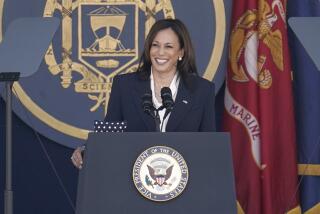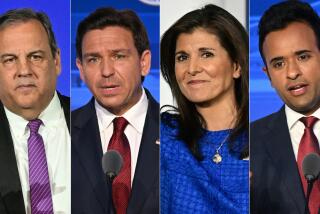NEWS ANALYSIS : Both Clinton, Gingrich Gain From Amicable Meeting : Politics: But other Republicans, Democrats seen as losers, especially presidential contenders. Apparent rapport created positive impression.
- Share via
MANCHESTER, N.H. — If both President Clinton and House Speaker Newt Gingrich gained from their joint appearance here in New Hampshire last weekend, as nearly all who analyzed the event agreed, then who lost?
One likely answer that emerged Monday was that the principal losers were other Republicans--particularly some of those seeking to retake the Presidency from Clinton--and other Democrats--particularly those hoping to regain control of Congress from the GOP.
“In some respects, it creates a public comfort level with divided government,” Democratic pollster Geoffrey Garin said of the harmonious duet the two normally adversarial leaders performed in Claremont, N.H., before a national television audience. “It’s an event that says it is not so terrible to keep a Democratic president with a Republican Congress.
“I think the people liked” the willingness of Clinton and Gingrich to compliment rather than attack each other, said Tom Rath, a veteran Republican strategist in New Hampshire and an adviser to the GOP presidential campaign of former Tennessee Gov. Lamar Alexander. “I think they liked the fact that the two guys get along.”
A key part in creating the impression was the apparent rapport between the Democratic chief executive and the GOP’s legislative point man.
“Trust is too strong a word” to describe the relationship, Gingrich told The Times after the joint appearance. “We have an interest in each other. We both think the other is worth talking to.”
That sort of attitude is necessary to make divided government work, as the nation learned during the 12 years that the GOP ran the White House under Presidents Ronald Reagan and George Bush while the Democrats controlled at least one house of Congress.
In terms of its impact on the presidential race, the Claremont event may not have been good news for any GOP presidential candidate other than the front-runner, Senate Majority Leader Bob Dole.
Gingrich, who wrapped up his four-day moose-viewing and speech-making tour of New Hampshire on Monday, continued to discount the notion he would enter the race for the White House. But the burst of publicity he received has made it that much more difficult for other GOP voices to be heard. And that doesn’t help those trying to cut away at Dole’s lead in the polls among Republican voters.
“Look, Dole is 30 points ahead,” noted William McInturff, an adviser to the Kansas Republican. “When you’re that far ahead, anything that freezes the race is fine.”
For the time being, the accommodationist stance struck by Clinton and Gingrich seems a convenient posture for both. For Gingrich, it helps deflect criticism of his abrasive style; for Clinton, it aids in allaying concerns that he is too much of a traditional liberal Democrat at heart.
McInturff viewed it as helpful for Clinton to present himself as someone who “serves as kind of a reasonable check on Republican efforts to cut back government, but also is willing to go ahead and cut a reasonable deal with the Republicans on reducing the deficit and changing Medicare.”
But the problem for Clinton is that such a posture leads to friction with his own party. “I think you can make the case that what’s good for Clinton’s reelection is not necessarily good for House Democrats,” said McInturff.
Democratic candidates for the House, for instance, might want to “demonize” their Republican foes on Medicare, rather than adopting the conciliatory tone Clinton used in his dialogue with Gingrich, McInturff said.
Reflecting on Clinton’s political situation, Gingrich said: “He zigzags. He can’t seem to decide whether the only way for him to win [reelection] is to move to the left and hope there is a third-party candidate and he can win with 42% of the vote [as in 1992], or whether he needs to move to the center and risk alienating the left and have Jesse Jackson as the third-party candidate.”
The intellectual Clinton is clearly a “New Democrat,” said Gingrich, using the term the President favored in 1992 to depict himself as a centrist. “But the political Clinton may really be an old Democrat with a great personality.”
Meanwhile, Gingrich faced a political problem of his own, as some conservatives griped that he had been too accommodating in dealing with a President who is held in contempt by many on the right.
The conservative Manchester Union Leader, New Hampshire’s largest newspaper, complained in an editorial Monday that in his demeanor toward Clinton, Gingrich had given “his best imitation of a shaggy lap dog grateful for the privilege of being in his master’s presence. . . . Normally combative Newt came across as--to switch metaphors--a pussy cat. Easy going, mild-mannered and amiable.”
“I don’t think we backed off our differences,” Gingrich said on a local radio talk show Monday. “But a lot of conservatives mistook tone for substance. On substance, there were some pretty clear differences,” he insisted, citing the President’s support for a minimum wage increase and for his national service program, both of which Gingrich made clear he opposes.
Gingrich also claimed he scored important substantive points in the Claremont session by “just getting the President to admit that the Medicare trust fund is going broke and that we do have to do something to fix it and that we do have to make major changes.”
On balance, Gingrich felt Clinton had been generous in agreeing to appear with him. “Anytime anybody can sit and talk with the President of the United States for an hour it is to their net advantage,” he said. “So [Clinton] was giving away an enormous benefit. I am dramatically less well known than he is. And in a relatively sympathetic setting where we can talk in entire sentences rather than sound bites, I came out as the substantial net gainer.”
Indeed, despite the conservative criticism, Gingrich had every reason to feel pleased with himself. After all, he came to New Hampshire to see a moose and ended up bagging a President.
More to Read
Get the L.A. Times Politics newsletter
Deeply reported insights into legislation, politics and policy from Sacramento, Washington and beyond. In your inbox twice per week.
You may occasionally receive promotional content from the Los Angeles Times.










